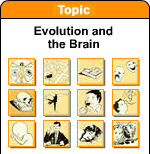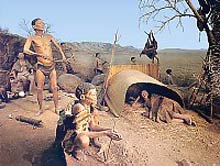| |
| |
 |
Our Evolutionary Inheritance |
 |
| | |




Why
You Can Have No More Than About 150 Real Friends
All of us know our recent personal
histories and can say what we did this morning or last year. But typically, we
know very little about our ancient history, when the human brain was developing.
Yet this ancient history of our brains has at least as important an effect on
our behaviour. It is this history, of the brains that preceded our own —
those of animals and of the first human beings — that evolutionary science
in general and evolutionary psychology in particular explore, in an attempt to
help us understand ourselves better. |
An adaptation is a trait
that developed in the course of evolution as a result of the mechanism of natural
or sexual selection. Adaptations are thus transmitted genetically and can be not
only anatomical but also psychological. In the case of psychological adaptations,
the selected genes help to lay down specific circuits in the brain. Thus the behaviours
that contribute the most to successful reproduction will be selected. |
| | Evolutionary psychology is
an approach that attempts to answer complex questions such as why we fall in love,
why we place so much stress on beauty, why we want to have children, why so many
people are unfaithful to their spouses, and why there is so much conflict and
injustice in the world.
Evolutionary psychology is not a sub-discipline
of psychology. It is a way of approaching the questions of psychology from the
special perspective of evolution. This approach is justified because the nervous
system that generates our
individual behaviours is the product not only of our personal history but
also, and most of all, of the evolutionary history of our species.
| The human species did not evolve in
modern cities or even in villages. An estimated 99% of the evolutionary history
of Homo sapiens took place in an environment resembling today's African
savannah. Throughout this period of over 2 million years, our ancestors lived
in small nomadic groups of hunter-gatherers. It was only 10 000 years ago that
some of them started to become sedentary and to practice agriculture. | |

The
Dorobos of Tanzania still live as hunter-gatherers, but their way of life is being
threatened by the gradual loss of their ancestral lands. | | The
key idea in evolutionary psychology is that the human brain should be seen as
a vast set of specialized
units or “modules” adapted to the problems that our hunter-gatherer
ancestors encountered in their environment (see sidebars).
In other words,
instead of regarding the human brain as a machine that can learn anything, evolutionary
psychologists see it more like a Swiss Army knife: a collection of various tools,
each of which performs a specific function. | Naturally,
evolutionary psychologists do recognize that all individuals develop their own
personal preferences and abilities in the course of their lives. But according
to evolutionary psychology, behind these personal attributes lie certain universal
attitudes that are found in all cultures. This “human nature” is the
result of the long process of hominization that has led to human beings as we
now know them.
Throughout their evolution,
the ancestors of today's human beings must have very often encountered venomous
animals, such as snakes and spiders, in their natural environment. Those humans
who were more afraid of such animals or had a spontaneous aversion for them probably
received fewer fatal bites and therefore probably reproduced more than those who
were braver . As a result, they passed their healthy fear of snakes and spiders
down to their descendants.
In contrast, many people have been killed
by automobiles, but since automobiles have been around for only about a hundred
years, not enough time has passed for any special evolutionary selection to take
place. Thus, we continue to have a fear
of snakes and spiders that no longer represent any real threat to us, while we
feel no such fear of automobiles, even though they cause thousands of deaths each
year.
Thus we see a good example of how evolutionary psychology can shed
light on a universal behaviour: by looking not at our current environment , but
rather at the environment in which almost all of our ancestors lived. Thus,
in a sense, inside our modern skulls we still have Stone Age brains.  |
|
|
|







